"Texas is a land of perennial drought, broken by the occasional devastating flood." This quote is attributed to a state meteorologist in 192...
1 min read

From boots to barbecue, Texas does a lot of things well, but functioning safely in ice and snow just isn’t one of them. Whether you live in Brownsville or Amarillo, make a resolution to be prepared this winter, and follow these basic winter weather safety tips.
For Employees
- Slip-resistant footwear is a must in the workplace after a winter storm. Employees should also utilize three points of contact while ascending and descending stairways and avoid carrying heavy loads in areas where ice has accumulated.
- Sand, rock salt and chemical de-icers can help eliminate winter weather slip hazards to a certain extent, but always evaluate walking routes to make sure employees are using the safest option in inclement weather. Slippery areas should be dried immediately and the walking surface should be identified a wet floor marker.
For Drivers
- Use the Three-Second Rule to control your speed year-round, but don’t forget to add a second of following distance for each hazardous condition you face on the road (low light, rain and ice are perfect examples). Find a safe place to pull over when conditions warrant.
- Car batteries may only have half the cranking power in freezing temperature, and even the best windshield wiper blades may only last 6 months. Add these action items to your typical auto maintenance checklist, along with a tire tread and winter-ready fluid check.
- Even at temperatures above freezing, black ice can be present almost anywhere. While it may look to the naked eye like a typical wet spot on the road, it’s a winter driving hazard that puts many Texans in the ditch.
For Property
- Copper and PVC pipes can crack or burst in freezing weather, so proper insulation is a must. In less severe freezing conditions, consider letting outside faucets drip, but they may need to be drained and their hoses disconnected in more severe cold weather.
- Extensive damage and water loss can occur when pipes burst in unoccupied or vacant buildings, so make sure and include these structures in your winter walkthrough. Ensuring the building remains heated may also help prevent issues with freezing.
Need more information on how you can prepare your workplace for severe winter weather? Check out our online resources, or reach out to your TML Risk Pool loss prevention representative today.



